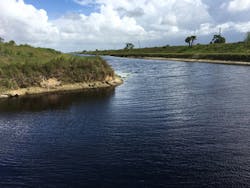TALLAHASSEE, FL, JAN 10, 2018 -- The Florida Department of Environmental Protection recently awarded more than $5.25 million for seven water-quality restoration projects and nine education and outreach projects to communities across Florida. The Division of Water Restoration Assistance's Nonpoint Source Management Program administers the grant funding received from the U.S. Environmental Protection Agency (EPA) through Section 319 of the Federal Clean Water Act.
"We are pleased to partner with EPA once again to award grants for innovative projects that will help restore and protect Florida's important waterways," said Trina Vielhauer, director of the Division of Water Restoration Assistance. "We are excited about the ways award recipients will affect change through nutrient reduction, Florida Friendly Landscaping and septic to sewer conversion projects, as well as public education and outreach to reduce nonpoint source pollution."
Nonpoint source pollution results from many widespread sources rather than a single, distinct origin, including stormwater runoff from urban surface areas and agricultural operations, septic tanks and erosion. As stormwater runoff moves, it carries both natural and man-made pollutants with it, depositing them into lakes, rivers, wetlands and coastal waters.
The Section 319 Nonpoint Source Grants are awarded for projects that reduce or eliminate these pollution sources and restore impaired springs, rivers, lakes and estuaries to meet Florida's stringent water-quality standards.
Examples of the recently awarded 2017 Section 319 Nonpoint Source Grants include:
- Port St. Lucie was awarded more than $425,000 in grant funding for the McCarty Ranch project to improve water quality of the North Fork of the St. Lucie River by reducing the amount of nitrogen and phosphorous occurring from agricultural and urban area runoff in the C-23 Canal. The project includes the incorporation of best management practices, such as using retention and infiltration basins to capture and remove nutrients from a portion of the canal.
- The University of Florida (UF) was awarded more than $564,000 in grant funding for the Florida Friendly Yards and Landscaping (FFL) program to educate Floridians about the relationship between landscaping choices and their environmental impacts. This funding will improve technical and administrative support to county FFL programs, improve web and other distance-learning opportunities and help provide updated materials for county programs. More than 20 years of partnership between EPA, DEP and the UF Institute of Food and Agricultural Sciences has supported local and regional projects that introduce and increase awareness of FFL principles.
The new Section 319 Nonpoint Source Education Grants are awarded for education and outreach projects that target reducing nonpoint source pollution in adopted basin management action plan (BMAP) areas.
Examples of the recently awarded 2017 Section 319 Nonpoint Source Education Grants include:
- Orange County was awarded a $150,000 grant for the Wekiva Springshed Education project, which provides educational outreach about septic system replacement or upgrades, citizen impacts on watersheds and appropriate fertilizer use, including the Orange County fertilizer ordinance. Educational methods may include signage, public service announcements, social media campaigns and other creative, innovative tools and messaging that inspires behavior change in individuals impacting the watershed.
- Volusia County was awarded a $240,000 grant for the Save Our Springs and Rivers project, a collaboration with Project H2O for promoting healthy habits through outreach. This marketing campaign focuses on the reduction of septic tank nutrients and fertilizer infiltration into groundwater discharging into Volusia Blue Spring, through a three-pronged approach. Creating public service announcements, hosting a water quality academy once a year for three years and conducting five low-impact development workshops will all be part of the outreach campaign. Subject matter includes threats to Volusia Blue Spring and the actions that can be taken to reduce those threats, specifically reduction of septic system discharge into groundwater.
In recent years, the EPA has awarded between $5-6 million of Section 319 funds annually to Florida for projects and activities designed to reduce the impacts of nonpoint source pollution. This is the first time $1 million of Section 319 funds has been awarded for nonpoint source education and outreach projects.
About DEP's Division of Water Restoration Assistance
The Division of Water Restoration Assistance is responsible for providing loans and grants for projects that improve the quality and quantity of the state's water resources and provide a significant benefit to the environment and local communities. Projects in several program areas are funded that improve stormwater quality, reduce pollutants entering surface water and groundwater, protect springs, collect and treat wastewater, produce and distribute drinking water, nourish beaches and reclaim mined land. For more information, visit floridadep.gov/WRA.



